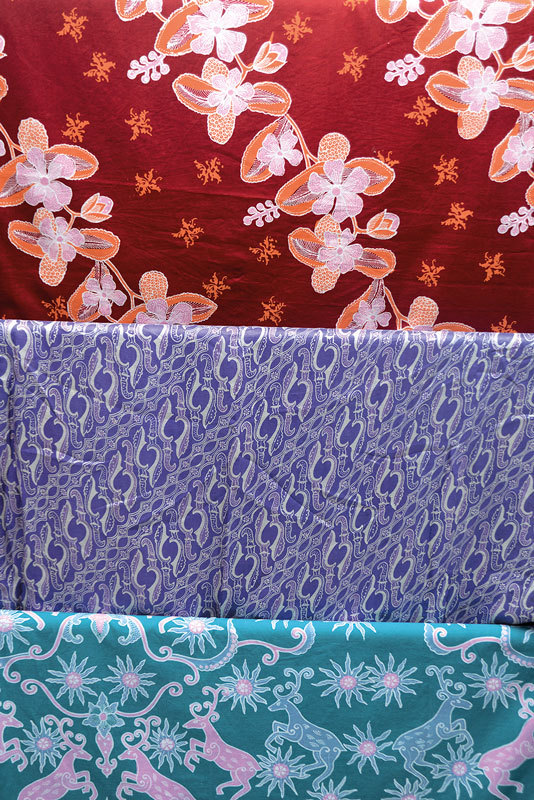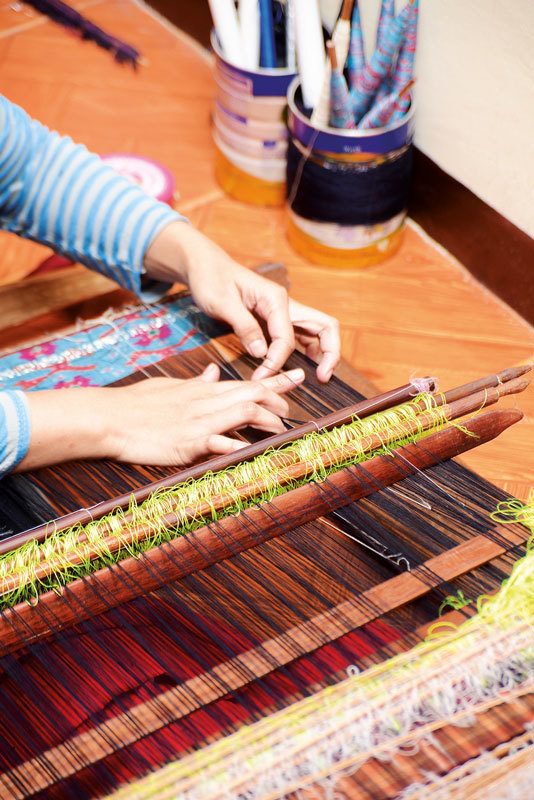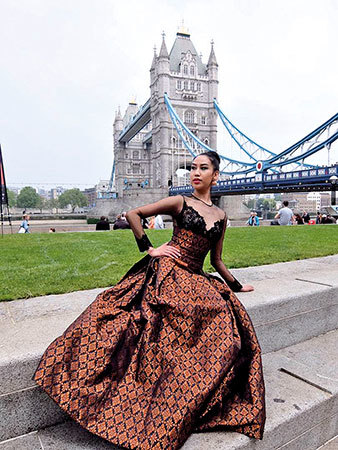In such a fast-paced world, it’s almost a peculiarity to embrace the opposite. Yet when it comes to fashion, many are now rebelling against globalised mass production and instead lining behind a movement that promotes eco-friendly, ethical production of garments – dubbed as slow fashion. Think natural fabrics, natural colouring and lots of love! We talked to a couple of big names in the local fashion industry who chose to slow down.
Batik Bogor Tradisiku, Bogor, West Java
Less than two hours of driving from Jakarta, Bogor is a popular weekend getaway for many Jakartans – many of whom would hunt for local food and snacks. Batik wasn’t much heard of there, until lately, with the rise of a local business called Batik Bogor Tradisiku, run by a man by the name of Siswaya.

When a powerful earthquake hit his hometown Yogyakarta in 2006, Siswaya felt an urge to help the people there. He asked five batik artists to move to Bogor, where he would set up a small business to help them.
“If I just gave them money or food, it wouldn’t last long. So I thought I would bring them to Bogor, where they could continue making batik and earn a living. After all, life is only meaningful when you could share it with others and help them,” Siswaya told NOW! Jakarta.
In setting up the business, Siswaya brainstormed ideas with a number of local artists and public figures. He finally decided that his brand of batik would display patterns that reflect local attributes or icons – such as Istana Bogor (Bogor Palace), raindrops and clouds (in reference to the city’s nickname, “Rain City”), Tugu Kujang (Kujang Monument) and Mount Salak.

The batik patterns soon became a hit. In 2009, a local government agency, Bogor National Crafts Council (Dekranasda), appointed Batik Bogor Tradisiku to produce its uniforms. Shortly, Siswaya earned a patent.
From five employees to more than 25 in less than a decade, it seems Batik Bogor Tradisiku is doing quite well. That is, thanks to its ability to foster good reputation.
All batik products here are made using natural colouring materials, such as secang tree barks (Caesalpinia sappan L.) for red hues and indigo (Indigofera tinctoria) for blue. A special waste management system ensures safe disposal of its liquid waste.
“Many university students and government officials have come here to analyse our liquid waste and they say that it is safe,” said Siswaya.
In 2015, Batik Bogor Tradisiku earned an Industri Hijau (Green Industry) Award in 2015 – adding to its dozens of other accomplishments.
Aside from clothing and fabric, the business also offers a wide array of other items – from shoes and sandals to pencil cases, bags, buckets, even teapots and cups – all made using batik materials. Here, nothing goes to waste.
Batik Bogor Tradisiku
Jl. Jalak No. 2
Tanah Sareal, Bogor, West Java 16161
T: (+62-251) 837 4616
Zainal Songket, Kebon Kacang, Central Jakarta
Originating in South Sumatera during the reign of Sriwijaya Empire, from 7th to 13th century, songket is a luxurious textile that has long been treasured by many.
A man named Zainal Arifin has devoted his life to preserving this legacy and promoting it to the world.

“This industry was made step by step ever since 1932 when my grandmother was still making songket. She passed it on to my mother in 1952. I myself started learning the technique of creating songket in 1982. Ten years later, the government finally legalised this entity as a company,” Arifin, who owns Zainal Songket, told NOW! Jakarta.
It wasn’t always smooth sailing for Arifin. For one, songket was less well known, when compared to batik. Production-wise, it takes an average of three to four months to finish each piece.
“I persisted. In 1987, I went to Jakarta and promoted my songket literally door-to-door. In the ‘90s, I met Ramli [Indonesian senior fashion designer], who introduced me to other designers such as Iwan Tirta, Prayudi and more. Ramli also encouraged me to become a designer and not merely a songket producer,” he recalled.

As the years went by, Zainal Songket gained more recognition at home and abroad. Wives of Indonesian presidents and A-list celebrities and other notable figures sought his creations. His designs have also made it to many prestigious fashion shows and runways in Singapore, Malaysia, Brunei Darussalam and France.
Throughout his career, Arifin has remained committed to using natural colourings such as turmeric and gambir, a tropical shrub native to Java and Bali. In keeping with tradition, each songket is carefully woven by hand using simple wooden-based machines that Arifin invented himself. An advanced treatment system removes contaminants in the liquid waste resulting from the production, turning it into eco-friendly, recycled water.
Zainal Songket
Jl. Kebon Kacang 29 No. 13
Kebon Kacang, Tanah Abang,
Central Jakarta 10240
T: (+62-21) 314 4461







